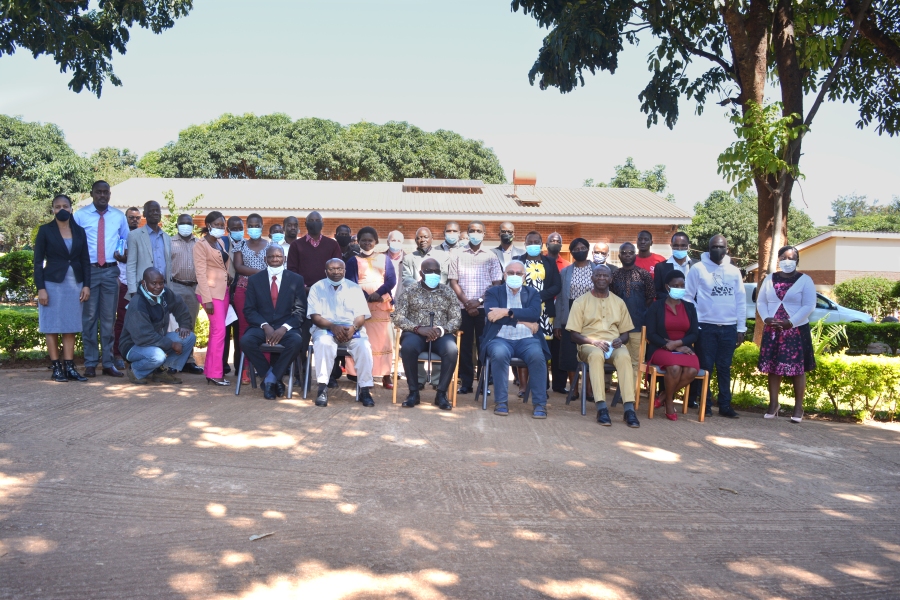Our Parish is named after St Thomas the Apostle and its Parish Priest happens to be Fr. Thomas. St Thomas the Apostle Parish is a semi-rural parish in the Diocese of Mzuzu in Northern Malawi. The Parish was created in October 2013. It currently has 17 prayer stations, 2 in town and 15 in the villages. The rural outstations are characterized by their distance from the Presbytery, the low number of their Christians and the poor or inexistent structures. One of the churches is not accessible by car. Most of these churches have very lively liturgies where all members participate in praying, singing and dancing. Our main Apostolate rotates around the ordinary administration of the sacraments, teaching/training of the Christians in the context of primary evangelization, Justice and Peace and Integrity of creation, and development works.
As a child I grew up in a village which was not even an outstation. The Catechist was the hero of the faith through his way of organizing the spiritual life of the people. The priest only came to the village once a year, under a special request on the feast of patron saint of the Christian Community, St. Andrew. Sisters and seminarians occasionally came during the Lenten Campaign for 2 to 3 days of teaching. I guess this has affected my missionary approach to remote areas. In a parish like St. Thomas, the temptation is to settle in town where life is softer and Christians are more capable intellectually and financially, while neglecting the rural outstations which are difficult to reach and have small numbers of Christians. Aware of this risk, we have adopted an old but efficient Missionary strategy of spending days at the outstations to maximize our presence among the Christians. We often go as a team, sometimes including Christians from town. The Christians of the outstations are always glad to receive us in their places and they are more than happy to have us in their midst. Materials such as drawings and movies are still relevant pastoral tools in such areas.
Such a Missionary approach goes with its requirement in personnel and finances. It is quite difficult to go to the distant outstations when there is only one priest at the presbytery. I happened to be alone for most part of the year 2020 and despite all the good will, I could only visit the distant outstations during week days. Finances are also crucial for one to reach out to such places. This has compelled us to reflect on ways to empower the parish financially so that it has enough to cover these expenses. Apart from the traditional ways of collecting funds such as tithe and offertory, we have explored ways of generating funds even in rural outstations where the livelihood of people is low, making it difficult to contribute meaningfully. Our Parish does a bit of farming on two farms: One for food crops where we are currently adding a piggery, and the other for tree farming where we have planted beyond 500 apple trees. In town we have small hostels which students of a nearby Technical College rent. Having seen the advantage of this, we have undertaken to build a proper hostel to receive around 100 students, though we are facing some financial difficulties to finish the works. Once completed, this will not only boost the income of the parish but also create a venue for retreats and trainings during holidays.
While some of the development works are for Income Generation, others are aimed at responding to the needs of the parish and the communities around us in areas of infrastructure: offices, school blocks, boreholes, making of bridges/roads in some rural places to enhance accessibility.
After 7 years of existence, St Thomas the Apostle Parish has managed to meet most of its basic needs including salaries of all the workers, upkeep of the confreres and stagiaires working in it, and also the cost of transportation for ministry.
Justice and Peace is part and parcel of our daily pastoral activities. It is very common for us to have to deal with cases where the lives and property of people accused of witchcraft are threatened. We also deal with early girl marriages mainly in the rural areas of the parish. It is fulfilling when after a long struggle a family finally understands that their young daughter is better at school than in a marriage. Also, we attempt to respond to the yearly struggle of the less privileged people during the transitory period before the maturity of their crops, when they are exposed to hunger and starvation. The Justice and Peace Commission of our Parish is also active. Luckily, an oncoming workshop in August 2021 on accompaniment of victims of various injustices will increase their capacities.
By: Thomas Delwende Pouya M.Afr.




